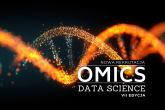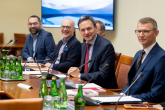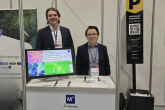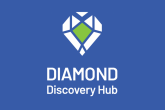MOSAIC Project Meeting in Warsaw

In mid-December, series of meetings for the MOSAIC project were held in Warsaw, bringing together three project partners: the African Conservation Centre (ACC), the Institut de Recherche pour le Développement (IRD), and the Interdisciplinary Centre for Mathematical and Computational Modelling at the University of Warsaw (ICM UW). The project, titled “Multi-site application of Open Science in the creAtion of healthy environments Involving local Communities (MOSAIC),” involves a total of 15 institutions from around the world and is funded by the Horizon Europe program: Environment and Health – Planetary Health.
The centerpiece of the meetings was a two-day workshop (December 16–17) dedicated to data repositories, prepared by a team of scientists and developers from ICM UW. The event, conducted by Łukasz Dumiszewski and his team under the title “MOSAIC-WP4 Repository Systems Workshop: Data Analysis, Functional Requirements, and Collaboration Principles,” was attended by:
- ACC: Winny Chricencia Odhach, Kennedy Sakimba Kimiti, Felista Ndunge Kimuyu, Victor Nyaliki Mose
- IRD: Joris Guérin, Stephane Debard
- ICM UW: Aneta Afelt, Łukasz Dumieszewski, Filipe Dias Lewandowski, Jakub Nejman, and Marta Hallay-Suszek.
“Our series of meeting in Warsaw follows two field visits: in Kenya, within the Amboseli Ecosystem—a cross-border region with Tanzania—and in Brazil, at two locations: (1) Tabatinga and Leticia, in the tri-border area of Brazil, Colombia, and Peru, and (2) Oiapoque, a region where Brazil borders French Guiana. In each of these locations, we were met with the warm openness of local communities. We personally witnessed the great hopes placed on the outcomes of our project. Now, in Warsaw, we gather at a moment when local, traditional, and scientific knowledge must be integrated into a formalized structure on a shared platform,” commented Dr. Aneta Afelt, Assistant Professor at ICM UW and leader of the Polish MOSAIC team.
On the days preceding the workshop (December 12–13), project consultations were also held between the ICM UW and African Conservation Centre teams. These meetings focused on the challenges faced by cross-border communities that can be addressed through dedicated IT tools. The team from Kenya also had the opportunity to explore the University of Warsaw’s HPC infrastructure and learn about ICM UW’s data science expertise.






MOSAIC (Multi-site application of Open Science in the creAtion of healthy environments Involving local Communities) – focuses on open, multimodal, and replicable information ecosystems supporting cross-border communities. MOSAIC secured funding from the European Union’s Horizon Europe framework program: Environment and health – Planetary health (HORIZON-HLTH-2023-ENVHLTH-02-01). The task is being carried out by an international consortium of 15 institutions led by the French institute IRD (Institut de Recherche pour le Développement). The role of ICM UW is to prepare data infrastructure and software for stakeholders. The leader of the Polish MOSAIC team is Dr. Aneta Afelt (assistant professor at ICM UW, member of Espace-DEV research group affiliated with IRD).

Funded by the European Union. Views and opinions expressed are however those of the author(s) only and do not necessarily reflect those of the European Union or European Health and Digital Executive Agency. Neither the European Union nor the granting authority can be held responsible for them.











